As U.S. researchers face funding cuts and political pressures under the Trump administration, Europe is extending a hand—and the Czech Republic is among the countries preparing to benefit from the potential exodus of top scientific talent.
With federal research budgets slashed, entire programs eliminated, and universities under increasing pressure, many American scientists are reevaluating their future at home. A recent Nature survey found that three-quarters of 1,650 scientists polled are considering leaving the United States, citing Europe and Canada as preferred destinations.
The European Union is responding swiftly. European Commission President Ursula von der Leyen recently announced a EUR 500 million (CZK 12.4 billion) package to support foreign researchers from 2025 to 2027, positioning Europe as a global magnet for science.
The European Research Council will also double funding for incoming grantees to up to EUR 2 million each. Countries like France, Germany, Belgium, and the Netherlands have launched initiatives to attract displaced researchers with institutional and national funding.
Czech scientists comment
The Czech Republic is also preparing to capitalize on Europe’s growing appeal to American scientists, Czech Television reports.
Jan Konvalinka, director of the Institute of Organic Chemistry and Biochemistry, believes the recent cuts to U.S. research funding and restrictions on scientific freedom have created an unfavorable environment for researchers.
“It leads to universities being in an acute financial crisis and may make them less motivated to recruit the best scientists,” he said.
The Institute, with a branch in Boston, is already seeing increased interest from top American scientists. “We are benefiting from this situation, with more important scientists and students expressing interest in working here,” Konvalinka added.
To attract international talent, the Institute runs programs offering substantial initial funding to set up labs in Czechia. “We provide several million to start, and by the second or third year, we expect researchers to secure their own funding,” Konvalinka said.
While the Academy of Sciences doesn’t have a unified strategy for attracting U.S. scientists, individual institutes like Konvalinka’s have long-established ties to U.S. research networks. Academy President Radomír Pánek noted, “Individual institutes can act independently and foster these connections.”












 Reading time: 2 minutes
Reading time: 2 minutes 


























